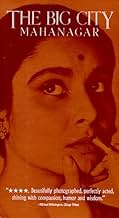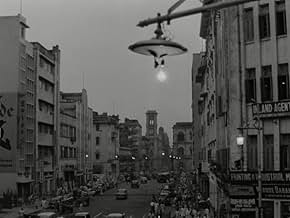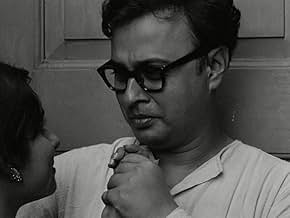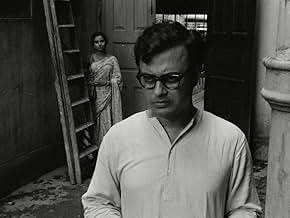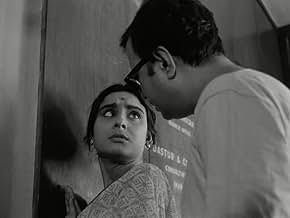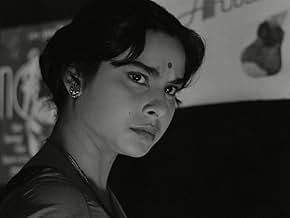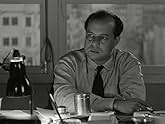Aggiungi una trama nella tua linguaLife at home changes when a house-wife from a middle-class, conservative family in Calcutta gets a job as a saleswoman.Life at home changes when a house-wife from a middle-class, conservative family in Calcutta gets a job as a saleswoman.Life at home changes when a house-wife from a middle-class, conservative family in Calcutta gets a job as a saleswoman.
- Regia
- Sceneggiatura
- Star
- Premi
- 4 vittorie e 1 candidatura in totale
- Arati Mazumder
- (as Madhabi Mukherjee)
- Bani
- (as Jaya Bhaduri)
- Sarojini (Subrata's Mother)
- (as Shephalika Devi)
- Himangshu Mukherjee
- (as Haradhan Banerjee)
Recensioni in evidenza
Subrata's father is a retired school teacher whose pupils have gone on to considerable success as doctors, lawyers, and businessmen while he has slid further into poverty. When the aging patriarch is in need of new eyeglasses, he turns to one of his former pupils to help him out. After Subrata casually mentions that a friend's wife has gone to work, Arati gets the idea of supplementing the family's meager income by getting a job herself but this idea is looked on with disdain by the traditionally-minded family. A "cold war" prevails in the household as Arati takes a job selling sewing machines in affluent neighborhoods, enrolling the woman of the house who is always at home.
After several abortive attempts in which she backs off after hearing the sound of a guard dog, Arati settles into her job and begins to thrive, gaining increased self-confidence and inner strength. Even young Pintu is mollified when his mother brings him home some toys after getting paid. Influenced by co-worker Edith (Vicky Redwood), an Anglo-Indian, Arati begins to wear lipstick and sunglasses and is more assertive with her boss (Haradhan Bannerjee) but her husband is resentful and complains that he doesn't know her anymore. Although Edith persuades her boss to grant the workers a commission on sales, he seems to resent her Westernized manner and feels more comfortable with Arati whom he offers a promotion.
Due to a run on the bank in which he is an employee, Subrata is laid off and this causes additional stresses and strains in the family but their love for each other transcends economics and allows Arati to stand up to her boss on a matter of principle. The Big City is not as sweeping in scope or as in-depth a character study as some of Ray's more well-known films, but it is an honest and compelling portrait of a young woman's discovery of herself with strong performances by Mr. Chatterjee and especially Ms. Mukherjee, who would go on to star in one of Ray's most acclaimed films, Charulata.
After having finished watching Mahanagar, I felt that the lonely house wife I had seen earlier had achieved a sense of fulfillment..a sense of completion.The entire film is a microcosm of an typical urbane family of the 1960's Calcutta. The legendary city of Calcutta in the 1960's has been impressionistic-ally captured with all its charm as well as confusion.We can see some of the best well-scripted, realistic emotional sequences. An young Jayabhaduri too appears as the little sister of Mr. Mazumdar(The main character's husband). Madhabi Mukherjee again dons a intense character and proves her brilliance in acting.Now I have become impatient enough to watch Ray's Calcutta Trilogy and other films too.It is very difficult to get good prints of most of them.
Ray had based this film on Abataranika, a Bengali short story. All the actors have been handpicked-especially Anil Chatterjee and Haren Chatterjee-who played the role of Mr. Mazumdar and his father.The film was well-received at the 14th Berlin Festival and Ray won a Silver Bear for direction. Even though it was rejected at the Oscars, it received an All India merit certificate at the National awards that year.
We see all sorts of manifestations of duality in Mahanagar. The tension-cum-rivalry of Arati and Subrata is, of course, the most obvious manifestation. However, we also have the duality of the new- generation Arati/Subrata and the old-generation Sarojini/Priyogopal (Subrata's mother and father) and Arati, who wears traditional clothing and speaks Bengali, versus Edith, the English-speaking Anglo-Indian in Western dress. These instances of duality speak directly to the moment in which things began to make a 180-degree shift in India, when women became the breadwinners of the household and traditional gender norms became subsumed by sexual liberation.
With a leading lady as precise as Mukherjee, Ray was able wrap these complex coterminous processes up in a relatively tidy package. Mahanagar is essential viewing.
The Big City is a subtle, flowing work about a young housewife (Madhabi Mukherjee, who would also star in Ray's Charulata) in a middle-class family who finds a job when her father-in-law needs a new pair of spectacles. The family is very conservative, and this upsets everyone. Her husband's manhood is somewhat insulted, her father- and mother-in-law (who both live with the married couple in a rather small apartment) feel that it's just not right, and her son thinks he's been forgotten. The only one who supports her is her younger sister-in-law; she sees her as a role model. The husband (Anil Chatterjee) tries to get her to quit, but, when he loses his own job, he changes his mind quickly. Now she becomes the breadwinner, and he is effectively castrated.
This could have been a little, humble film, like many of Ray's works. But here he decides to examine a huge portion of his own culture, setting up many opposites and studying them closely. We have the husband and wife, man and woman, old-world conservatism and new-world progression, young and old, employer and employee. The list goes on. The depth of this film is nearly endless, and I'm sure it would hold up to any number of repeated viewings. The only flaw that I can see is a somewhat contrived climax - Ray had this problem in a few of his films.
I do have to give special praise to the two leads. Mukherjee and Chatterjee are just brilliant in the film. The supporting cast is also uniformly excellent.
Through this wonderful family drama, Ray tells us a story of the clash between modern and traditional values in a middle-class family struggling to make a living in the big city. Furthermore, Ray examines the 'urban' relationships as is reflected between the employer and employee, the husband and wife, the co-workers, the working mother and her child and so on. It is no surprise that Ray is THE most accomplished director of Indian cinema. This film, like pretty much everything else he did, only reminds us why.
The performances are top-notch. Again, this is no surprise as Ray manages to extract the best from his actors. Madhabi Mukherjee is breathtaking as we see her transform from a naive housewife, to a determined and excited employee to a strong courageous woman who stands up for her friend. Anil Chatterjee is excellent as the struggling husband who tries to make ends meet, silently accepts his wife's working but secretly resenting it. Vicky Redwood adds freshness with a strong presence and a likable performance. Haradhan Bannerjee is very good as the prejudiced but sympathetic boss. Jaya Bhadhuri delivers a very natural performance. The rest of the cast are all just as competent.
The ending isn't the traditional happy ending one witnesses in the numerous Indian films but it's one of optimism and hope that beautifully 'seals' the film. 'Mahanagar' is a fantastic example of the best of Indian cinema. A classic gem it is.
Lo sapevi?
- QuizFifteen-year old Jaya Bhaduri's (later known as Jaya Bachchan) film debut and her only film with Satyajit Ray.
- BlooperWhen Priyogopal (Subrata's father) goes to visit his student Anupam Roychowdhury to ask for money he is shown having a conversation with Anupam in his office. When he is explaining his circumstance the camera shows him only sitting on a chair with his walking stick. In the very next scene when all the three characters are shown (third one being Anupam's wife ) the top of his walking stick has changed direction. The round bit on top was towards the right before and is turned to the left in the very next scene.
- Citazioni
Arati: You wouldn't recognize me on the job.
Subrata Mazumdar: What about at home? Would I recognize you at home?
Arati: You don't recognize me? Tell me honestly.
[Subrata shakes his head no]
Arati: Why not?
Subrata Mazumdar: It all feels a bit unfamiliar. It feels a bit...
Arati: What about this?
[points at her cheek]
Arati: You don't recognize my mole? I'm still the same housewife.
- ConnessioniReferenced in Creative Artists of India: Satyajit Ray (1964)
I più visti
- How long is The Big City?Powered by Alexa
Dettagli
- Data di uscita
- Paese di origine
- Sito ufficiale
- Lingue
- Celebre anche come
- The Big City
- Luoghi delle riprese
- RN Mukherjee Rd, Calcutta, Bengala Occidentale, India(closing shot: view of the city)
- Azienda produttrice
- Vedi altri crediti dell’azienda su IMDbPro
- Tempo di esecuzione2 ore 16 minuti
- Colore
- Mix di suoni
- Proporzioni
- 1.37 : 1


